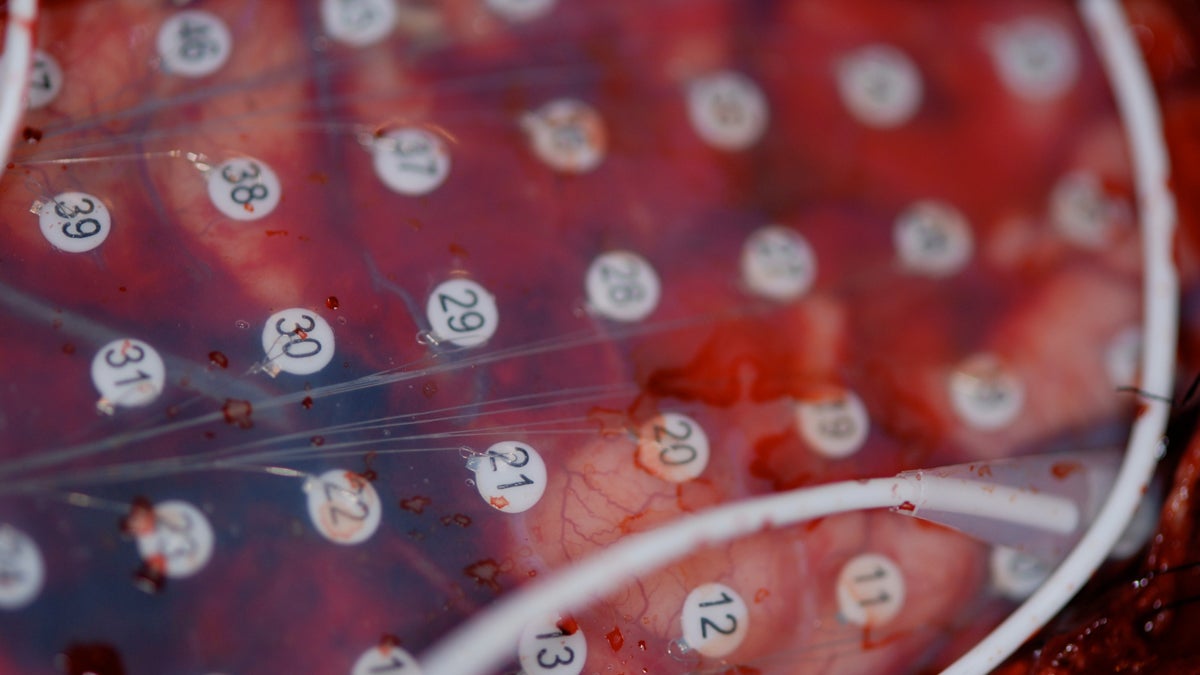Philadelphia researchers to create brain prosthesis to restore memory loss

The exposed brain of one of Dr. Gordon Baltuch's epilepsy patients with a subdural grid. The numbers provide a way to determine which parts of the brain seizures come from, and can mark places where physicians might want to selectively stimulate the brain. (Image courtesy of Gordon Baltuch/University of Pennsylvania)
Philadelphia scientists will soon be working to create a device that can restore memory to people who suffered a traumatic brain injury.
It sounds a bit like science fiction, but thanks to funding from DARPA — the federal agency behind the start of the Internet — Philadelphia scientists will soon be working to create a device that can restore memory to those affected by traumatic brain injury.
The four-year, $22.5 million project, which is part of President Obama’s BRAIN Initiative, involves the University of Pennsylvania, Thomas Jefferson and Drexel Universities. Another team at UCLA will also be working on a similar device.
The idea behind the neuro prosthetic is carefully placed electrical stimulation.
“The device will be next-generation technology to allow us to stimulate not at just one or two electrodes in the brain, but at hundreds of electrodes,” said Penn psychologist Michael Kahana, “and to use the brain’s own signals to guide stimulation.”
To find out what stimulation is right, the team will first monitor people who already have electrodes in their brain for treatment purposes — epilepsy and Parkinson’s patients. As the patients play memory games, researchers will map their brain signals to learn what the brain looks like when memory ability is high — and where, perhaps a quick zap might jolt a faltering brain back into action.
Drexel biomedical engineer Joshua Jacobs, for example, plans to try this out specifically for spatial memory.
“When a person is in a brain state whereby they are not going to do a good job of navigating an environment or remembering where a new landmark is,” he said, “then we can use stimulation to kind of nudge their brain in the correct direction so they can do a better job of remembering what they’ve encountered in a spatial setting.”
Others will perform similar tests for verbal memory.
Kahana, who is the lead investigator for the project, likens the process of continuously reading brain signals to a movie, going by frame by frame.
“In each frame we analyze the picture, say, is that the picture we want? Or is it off the mark? And if it’s off the mark we try to get it back on track, right in time for the next frame,” he said.
Penn neurosurgeon and head of the Parkinson’s side of the research, Gordon Baltuch, knows the project is ambitious.
“This is sort of put a man on a moon type of project,” he said. “The hurdle is high but definitely we have real timelines we have to meet, and that’s going to be our big challenge.”
Kahana said the team, in collaboration with the device manufacturer Medtronic, plans to have an external device that can target 256 sites in the brain within three years. Later, Kahana said they would like to make the prothesis implantable, and successful in treating the severe types of memory loss seen frequently in soldiers who have returned from Iraq or Afghanistan after a blast to the head.
Even if they are successful, it will take more time before FDA approval makes the device available for regular use.
“This is a process that will take years to accomplish,” said Michael Sperling, a neurologist at Jefferson who will handle the experiments in epilepsy patients. “We will move gradually in a very systematic way to be cautious, and it is unlikely that great miracles will occur early on… It will not be easy.”
WHYY is your source for fact-based, in-depth journalism and information. As a nonprofit organization, we rely on financial support from readers like you. Please give today.

